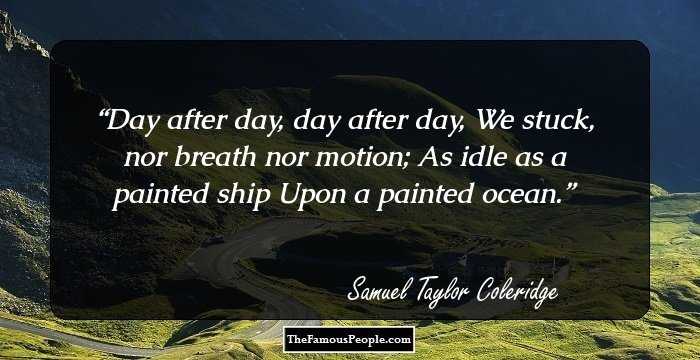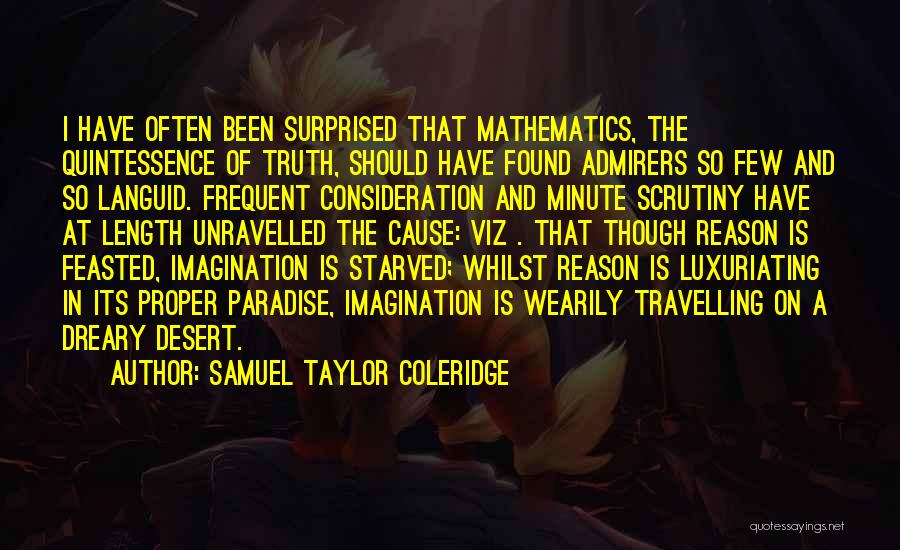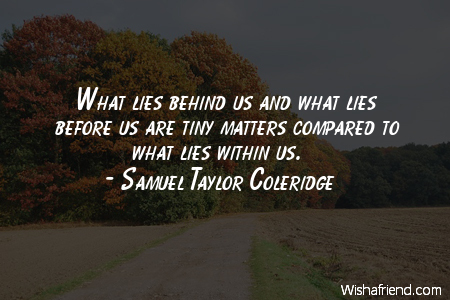HISTORY OF EUROPEAN SPIRIT: SAMUEL TAYLOR COLERIDGE
Σε αυτήν την ιστοσελίδα της Hellenic Poetry θα παρουσιάσουμε αποσπάσματα από το δωδεκάτομο έργο του Παναγιώτη Κανελλόπουλου: Ιστορία του Ευρωπαϊκού πνεύματος, Εκδόσεις Δ. Γιαλλέλης, 1998.
Ξεκινάμε λοιπόν με τον τόμο ΙΧ’, Κεφάλαιο 203, που αναφέρεται στον Σάμουελ Ταίηλορ Κόλριτζ.
Σάμουελ Ταίηλορ Κόλριτζ (Samuel Taylor Coleridge, 1772-1834): ποιητής, φιλοσοφικός στοχαστής και κριτικός.
Συγγενείς του:
Τζέημς Ταίηλορ Κόλριτζ (Captain James Coleridge, 1760-1836): πρεσβύτερος αδελφός, ποιητής.
(Hartley Coleridge, 1796-1849): γιός του, αξιόλογος κριτικός και ποιητής.
[…]
Λέει ο ίδιος ότι δεν γεννήθηκε μέσα του καμμιά δυσπιστία, γιατί ο νους του, με το διάβασμα παραμυθιών με μάγους και πνεύματα, είχε εθισθεί «στο Αχανές» «και ποτέ μου δεν είχα θεωρήσει τις αισθήσεις μου ως τα κριτήρια για όσα θα πίστευα. Όλα όσα θα πίστευα τα ερρύθμιζα, ήδη στην ηλικία εκείνη με τις ιδέες μου, όχι με την όρασή μου»
Lyrical Ballads, 1798
Coleridge and Wordsworth collaboratively published Lyrical Ballads in 1798, marking the rise of the British Romantic movement. According to Coleridge, in their collaborative plans it was agreed Coleridge would compose a series of lyrical poems exploring the Romantic and supernatural, and seeking there to earn a readers’ “poetic faith,” while Wordsworth planned to use the self and the everyday as his subject in poems that would replace a sense of familiarity with an air of the supernatural. Pairing these two approaches, the poets hoped, might bring into harmony “the two cardinal points of poetry, the power of exciting the sympathy of the reader by a faithful adherence to the truth of nature, and the power of giving the interest of novelty by the modifying colors of imagination.”
Coleridge contributed his well-known poem, “Rime of the Ancient Mariner,” while Wordsworth ultimately composed the bulk of the collection. After the publication of Lyrical Ballads, the pair traveled throughout Europe. Afterwards, Coleridge lectured and traveled extensively, and, while battling an opium addiction, moved in with physician James Gillman in 1816. The following year Biographia Literaria, a fusion of autobiography, literary criticism, and religious and philosophical theory, was published.
[…]
But in order to render myself intelligible I must previously, in as few words as possible, explain my ideas, first, of a POEM; and secondly, of POETRY itself, in kind, and in essence.
The office of philosophical disquisition consists in just distinction; while it is the privilege of the philosopher to preserve himself constantly aware, that distinction is not division. In order to obtain adequate notions of any truth, we must intellectually separate its distinguishable parts; and this is the technical process of philosophy. But having so done, we must then restore them in our conceptions to the unity, in which they actually co-exist; and this is the result of philosophy. A poem contains the same elements as a prose composition; the difference therefore must consist in a different combination of them, in consequence of a different object proposed. According to the difference of the object will be the difference of the combination. It is possible, that the object may be merely to facilitate the recollection of any given facts or observations by artificial arrangement; and the composition will be a poem, merely because it is distinguished from composition in prose by metre, or by rhyme, or by both conjointly. In this, the lowest sense, a man might attribute the name of a poem to the well-known enumeration of the days in the several months. And as a particular pleasure is found in anticipating the recurrence of sounds and quantities, all compositions that have this charm superadded, whatever be their contents, may be entitled poems.
[…]
The reader should be carried forward, not merely or chiefly by the mechanical impulse of curiosity, or by a restless desire to arrive at the final solution; but by the pleasurable activity of mind excited by the attractions of the journey itself. Like the motion of a serpent, which the Egyptians made the emblem of intellectual power; or like the path of sound through the air; at every step he pauses and half recedes, and from the retrogressive movement collects the force which again carries him onward. Precipitandus est liber spiritus [the free spirit must be hurried onward—ed.], says Petronius Arbiter most happily. The epithet, liber, here balances the preceding verb; and it is not easy to conceive more meaning condensed in fewer words.
But if this should be admitted as a satisfactory character of a poem, we have still to seek for a definition of poetry. The writings of PLATO, and Bishop TAYLOR, and the Theoria Sacra of BURNET, furnish undeniable proofs that poetry of the highest kind may exist without metre and even without the contradistinguishing objects of a poem. The first chapter of Isaiah (indeed a very large proportion of the whole book) is poetry in the most emphatic sense, yet it would be not less irrational than strange to assert, that pleasure, and not truth, was the immediate object of the prophet. In short, whatever specific import we attach to the word, poetry, there, will be found involved in it, as a necessary consequence, that a poem of any length neither can be, or ought to be, all poetry. Yet if an harmonious whole is to be produced, the remaining parts must be preserved in keeping with the poetry; and this can be no otherwise effected than by such a studied selection and artificial arrangement, as will partake of one, though not a peculiar, property of poetry. And this again can be no other than the property of exciting a more continuous and equal attention, than the language of prose aims at, whether colloquial or written.
[…] What is poetry? is so nearly the same question with, what is a poem? that the answer to the one is involved in the solution of the other. For it is a distinction resulting from the poetic genius itself, which sustains and modifies the images, thoughts, and emotions of the poet’s own mind. A poet, described in ideal perfection, brings the whole soul of man into activity, with the subordination of its faculties to each other, according to their relative worth and dignity. He diffuses a tone, and spirit of unity, that blends, and (as it were) fuses, each into each, by that synthetic and magical power, to which we have exclusively appropriated the name of imagination. This power, first put in action by the will and understanding, and retained under their irremissive, though gentle and unnoticed, control (laxis effertur habenis [it is carried onwards with loose reins—ed.]) reveals itself in the balance or reconciliation of opposite or discordant qualities: of sameness, with difference; of the general, with the concrete; the idea, with the image; the individual, with the representative; the sense of novelty and freshness, with old and familiar objects; a more than usual state of emotion, with more than usual order; judgment ever awake and steady self-possession, with enthusiasm and feeling profound or vehement; and while it blends and harmonizes the natural and the artificial, still subordinates art to nature; the manner to the matter; and our admiration of the poet to our sympathy with the poetry. “Doubtless,” as Sir John Davies observes of the soul (and his words may with slight alteration be applied, and even more appropriately to the poetic IMAGINATION).
Doubtless this could not be, but that she turns
Bodies to spirit by sublimation strange,
As fire converts to fire the things it burns,
As we our food into our nature change.
From their gross matter she abstracts their forms,
And draws a kind of quintessence from things,
Which to her proper nature she transforms
To bear them light, on her celestial wings.
Thus does she, when from individual states
She doth abstract the universal kinds;
Which then re-clothed in divers names and fates
Steal access through our senses to our minds.
Finally, GOOD SENSE is the BODY of poetic genius, FANCY its DRAPERY, MOTION its LIFE, and IMAGINATION the SOUL that is everywhere, and in each; and forms all into one graceful and intelligent whole.
Source: Poetic Foundation
Γράφει για τον αγαπημένο του δάσκαλο:
«Από αυτόν έμαθα, ότι η Ποίηση, ακόμα κι εκείνη των πιο υψηπετών και, φαινομενικά, πιο αχαλίνωτων ωδών, έχει μια δική της λογική, εξίσου αυστηρή όσο η λογική της επιστήμης, και πιο δύσκολη, επειδή είναι πιο λεπτή, πιο περίπλοκη, και εξαρτημένη από όλο και περισσότερο φευγαλέες αιτίες. Στους αληθινά μεγάλους ποιητές, συνήθιζε να λέει, πρέπει να αναζητούμε ένα λόγο όχι μόνο για κάθε λέξη, αλλά και για τη θέση, που κατέχει η κάθε λέξη…»
[…]
Σε μιαν επιστολή του προς τον Σάουθυ ο Κόλριτζ γράφει: «Η κατευθυντήρια ιδέα της παντισοκρατίας (παν-ισοκρατίας) είναι να κάνει κανείς τους ανθρώπους αναγκαστικά ενάρετους με τον παραμερισμό όλων των κινήτρων του κακού, κάθε δυνατού πειρασμού».
[…] λέει για τις αιματηρές ακρότητες που σημειώθηκαν στη Γαλλία (Γαλλική επανάσταση): «Ας μη ικανοποιούμε τις κακίες μας πίσω από τη μάσκα της ανθρωπιάς. Αντί να διαμαρτυρόμαστε με ρητορική μανία για τις ακρότητες εκείνες, θα εκάναμε πιο χρήσιμη δουλειά , αν ανιχνεύαμε, από που επήγασαν».
Στην ίδια διάλεξη ο Κόλριτζ παρατηρεί: «Τα χρονικά της Γαλλικής Επαναστάσεως έχουν καταγραφεί, με γράμματα από αίμα, ότι η γνώση των ολίγων δεν μπορεί να αντιπράξει στην άγνοια των πολλών· ότι το φως της φιλοσοφίας, όταν έχει περιορισθεί σε μια μικρή μειονότητα, δείχνει τους κατόχους του μάλλον σαν θύματα παρά σαν διαφωτιστές του πλήθους. Οι πατριώτες της Γαλλίας ή έπεσαν στην επικίνδυνη και γιγάντια πλάνη να χρησιμοποιήσουν ένα βέβαιο κακό σαν μέσο για ένα ενδεχόμενο αγαθό, ή θυσιάσθηκαν από τον όχλο, που με τις προλήψεις του και την αγριότητά του η ανένδοτη αρετή τους δεν τους επέτρεψε να αφομοιωθούν».
[…]
Για τον Ροβεσπιέρο λέει ότι ο μακρινός στόχος, όπου είχε κατευθύνει τα βήματά του, του φαινόταν μέγας κι ωραίος, αλλά είχε προσηλώσει το βλέμμα του σ’ αυτόν με τέτοιο ζήλο, ώστε παραμέλησε να προσέξει, ότι ο δρόμος που οδηγούσε εκεί, ήταν ρυπαρός. Η ζοφερή φαντασία του τον έκαμε να βλέπει παντού συνωμοσίες κατά της ελευθερίας, κ’ έτσι για να αποτρέψει την τυραννία, έγινε τύραννος.
Λέει επίσης: «Παράξενοι, υπόκωφοι κρότοι και συγκεχυμένοι θόρυβοι σημειώνονται πάντα πριν από τους σεισμούς και τις καταιγίδες του ηθικού κόσμου».
Λέει ακόμη: «Βέβαιοι μπορούμε, ωστόσο, νάμαστε, είτε είμαστε Χριστιανοί, είτε άπιστοι, είτε αριστοκράτες, είτε ρεπουμπλικάνοι, ότι ο νους μας είναι σε κατάσταση, που τον κάνει ανεπίδεκτο για γνώση, αν κατεχόμαστε από το ζήλο να βρούμε το ψεύδος στους συλλογισμούς ενός αντιπάλου, και όχι από τον ειλικρινή πόθο να ανακαλύψουμε, μήπως υπάρχει αλήθεια στοτς συλλογισμούς αυτούς».
Ο ΔΙΟΝΥΣΗΣ ΚΑΨΑΛΗΣ, γεννήθηκε στην Αθήνα το 1952. Σπούδασε κλασική και αγγλική φιλολογία στις ΗΠΑ (1970-1974) και νεοελληνική φιλολογία στο Λονδίνο (1981-1984), όπου επίσης δίδαξε για δύο χρόνια.
↓
Από το 1978 έχει δημοσιεύσει εικοσιένα ποιητικά βιβλία (όλα, εκτός του πρώτου, στις Εκδόσεις Άγρα), έξι τόμους με δοκίμια (όλα στις Εκδόσεις Άγρα), ποιητικές μεταφράσεις (μια επιλογή από τα Σονέτα του Σαίξπηρ, ποιήματα της Έμιλυ Ντίκινσον και του Κόλεριτζ, χαϊκού του Ίσσα και του Μπασό, το Χειμωνιάτικο ταξίδι του Βίλχελμ Μύλλερ, τον Έρωτα του ποιητή του Χάινε κ.α.). Έχει μεταφράσει για το θέατρο έργα του Σαίξπηρ όπως τα Ρωμαίος και Ιουλιέτα, Ο βασιλιάς Ληρ, Οθέλλος, Όνειρο καλοκαιρινής νύχτας, Περικλής και Άμλετ. Βιβλιοκρισίες του έχουν δημοσιευθεί σε διάφορα περιοδικά και εφημερίδες.
Frost at Midnight
By Samuel Taylor Coleridge
↓
The Frost performs its secret ministry,
Unhelped by any wind. The owlet’s cry
Came loud—and hark, again! loud as before.
The inmates of my cottage, all at rest,
Have left me to that solitude, which suits
Abstruser musings: save that at my side
My cradled infant slumbers peacefully.
‘Tis calm indeed! so calm, that it disturbs
And vexes meditation with its strange
And extreme silentness. Sea, hill, and wood,
This populous village! Sea, and hill, and wood,
With all the numberless goings-on of life,
Inaudible as dreams! the thin blue flame
Lies on my low-burnt fire, and quivers not;
Only that film, which fluttered on the grate,
Still flutters there, the sole unquiet thing.
Methinks, its motion in this hush of nature
Gives it dim sympathies with me who live,
Making it a companionable form,
Whose puny flaps and freaks the idling Spirit
By its own moods interprets, every where
Echo or mirror seeking of itself,
And makes a toy of Thought.
But O! how oft,
How oft, at school, with most believing mind,
Presageful, have I gazed upon the bars,
To watch that fluttering stranger ! and as oft
With unclosed lids, already had I dreamt
Of my sweet birth-place, and the old church-tower,
Whose bells, the poor man’s only music, rang
From morn to evening, all the hot Fair-day,
So sweetly, that they stirred and haunted me
With a wild pleasure, falling on mine ear
Most like articulate sounds of things to come!
So gazed I, till the soothing things, I dreamt,
Lulled me to sleep, and sleep prolonged my dreams!
And so I brooded all the following morn,
Awed by the stern preceptor’s face, mine eye
Fixed with mock study on my swimming book:
Save if the door half opened, and I snatched
A hasty glance, and still my heart leaped up,
For still I hoped to see the stranger’s face,
Townsman, or aunt, or sister more beloved,
My play-mate when we both were clothed alike!
Dear Babe, that sleepest cradled by my side,
Whose gentle breathings, heard in this deep calm,
Fill up the intersperséd vacancies
And momentary pauses of the thought!
My babe so beautiful! it thrills my heart
With tender gladness, thus to look at thee,
And think that thou shalt learn far other lore,
And in far other scenes! For I was reared
In the great city, pent ‘mid cloisters dim,
And saw nought lovely but the sky and stars.
But thou, my babe! shalt wander like a breeze
By lakes and sandy shores, beneath the crags
Of ancient mountain, and beneath the clouds,
Which image in their bulk both lakes and shores
And mountain crags: so shalt thou see and hear
The lovely shapes and sounds intelligible
Of that eternal language, which thy God
Utters, who from eternity doth teach
Himself in all, and all things in himself.
Great universal Teacher! he shall mould
Thy spirit, and by giving make it ask.
Therefore all seasons shall be sweet to thee,
Whether the summer clothe the general earth
With greenness, or the redbreast sit and sing
Betwixt the tufts of snow on the bare branch
Of mossy apple-tree, while the night-thatch
Smokes in the sun-thaw; whether the eave-drops fall
Heard only in the trances of the blast,
Or if the secret ministry of frost
Shall hang them up in silent icicles,
Quietly shining to the quiet Moon.
Έγραψε την ωδή «Γαλλία», που σημειώνει οριστική αποστροφή του ποιητή και πολιτικού στοχαστή από τις επαναστατικές ακρότητες, και που καταλήγει στη μελαγχολική υποψία-σχεδόν βεβαιότητα- ότι το ιδεώδες της Ελευθερίας είναι ανέφικτο στη κοινωνία των ανθρώπων, κάτω από οποιοδήποτε κυβερνητικό σύστημα, και ότι ανήκει μόνο στον ατομικόν άνθρωπο, σ’ εκείνον, που-καθαρός μέσα του- φλέγεται από «τη λατρεία του Θεού στη Φύση».
Στο 1801, ο Κόλριτζ άρχισε να γίνεται οπιομανής. Από καιρό -από τα νεανικά του χρόνια όταν σπούδαζε στο Καίμπριτζ- χρησιμοποιούσε φάρμακα, που περιείχαν όπιο, για να καταπραΰνει τους ρευματικούς ή άλλους σωματικούς πόνους του. Το θαυμάσιο ποίημα «Κούμπλα Χαν» τόγραψε το καλοκαίρι του 1797, όταν ξύπνησε από ένα βαθύ ύπνο τριών ωρών, που τον είχε προκαλέσει ένα ισχυρό ναρκωτικό.
↓
Κούμπλα Χαν.
Στο Ξαναντού διάτάξε ο Κούμπλα Χαν
να χτίσουνε παλάτι ηδονής.
Εκεί που τ’ Άλφ τ’ άγια νερά κυλάν
μέσ’απ’αμέτρητες σπηλιές, πριν παν
στην αγκαλιά θάλάσσας σκοτεινής.
Δυό φορές πέντε μίλια χώμα καρπερό
κυκλώσαν κάστρα κι’ ένα τείχος φοβερό,
φιδίσια τρέχανε ρυάκια, λάμπαν άλση
και ανθισμένα λιβανόδεντρα
κι’ήσαν αρχαία σαν τους λόφους δάση,
που φωτεινά’γκαλιάζαν σύδεντρα.
Αλλ’ ω! έκοβε φαράγγι μυθικό
τον πρασινόλοφο, τον κεδροφυτεμένο,
άγριο μέρος! άγιο όσο μαγικό,
γυναίκας θρήνος, για εραστή δαιμονικό,
σε φεγγαρόχαση ποτέ ‘χε στοιχειωμένο..
Κι’ απ’ το φαράγγι μ’ ένα σάλο αναβρασμού,
λες και σε κρίση η γης ανάσαινε πνιγμού,
τινάχτη απότομα πανίσχυρη πηγή..
Και μέσ’ τους πίδακες που βγαίναν ‘δώ και ‘κεί,
και βράχους πού ‘πεφταν σαν ξαφνικό χαλάζι
χορεύοντας, όπώς φλοιούς τινάζει
του θεριστή από τα στάχυα το κοπάνι,
με μιάς, για πάντα, τ’ άγιο ανάβλυσε ποτάμι.
Για πέντε μίλια, από κοιλάδες κι’από δάση,
σαν μαίανδρος τ’ άγιό ‘τρεχε ποτάμι
κι’ ύστερα από σπηλιές που νους δεν βάνει,
πριν σε νεκρό ωκεανό βροντοβουλιάξει.
Κι’ άκουσε στις βροντές να προμηνάν
προγόνοι πόλεμο φρικτό ο Κούμπλα Χαν!
Του παλατιού της ηδονής ο ίσκιος
πάνω στα κύματα επέπλεε
εκεί που απ’ την πηγή ο ήχος
και τις σπηλιές ανάκατα έφτανε.
Ένα ηλιόλουστο παλάτι ηδονής, σαν από μάγο
χτισμένο λες..και οι σπηλιές του από πάγο!
Σε όραμα που κάποτε εγώ είδα,
κόρη απ’ της Αβησσυνίας την χώρα
σαντούρι έπαιζε και τραγουδούσε ‘νά σκοπό,
σκοπό παράξενο, για το βουνό Αμπόρα..
Αν μέσα μου μπορούσα εγώ ξανά
τα λόγια.. τον σκοπό να θυμηθώ,
τόση αγαλλίαση θα ένοιωθα, βαθειά,
που στον αέρα το παλάτι’κείνο’γώ
θα τό ‘κτιζα.. με τέτοια μουσική,
το λιόλουστο παλάτι! τις παγοσπηλιές!
κι’ όσοί ακούγαν θε να τό’βλεπαν εκεί..
κι’ όλοι θ’ ανάκραζαν:-Προσέχτε! προσοχή!
μαλλιά’χει π’ανεμίζουν, στα μάτια του αστραπή!
Χαράξτε γύρω του ‘νά κύκλο τρεις φορές,
κλείστε τα μάτια σας με τρόμο ιερό,
γιατί μεγάλωσε με μέλι και νερό
και γάλα ήπιε από παράδεισου πηγές…
Samuel Taylor Coleridge,1798.
Απόδοση στην ελληνική: Μ.Ελμύρας.
↓
Δεν ήταν ο μόνος Άγγλος υψηλής πνευματικής στάθμης, που στις πρώτες δεκαετίες του ΙΘ’ αιώνα κυριεύθηκε από την ανάγκη να βρίσκει ανακούφιση , ή και ευδαιμονία στο όπιο. Ο Μπωντλαίρ, σ’ ένα από τα έξοχα πεζογραφήματά του το 1860, έχει αναλύσει με ενθουσιασμό τις «Εξομολογήσεις ενός Άγγλου οπιοφάγου», έργο του Τόμας ντε Κουίνση που πρωτοδημοσιεύθηκε στο 1821, […]. Ο ντε Κουίνση ήταν δεκαεννιά χρονών , όταν, στο 1807, συνάντησε πρώτη φορά τον Κόλριτζ, που τον εθαύμαζε ως ποιητή. […] Κι ήταν ήδη, στο 1807, ο δεκαεννάχρονος ντε Κουίνση παραδομένος στο όπιο, που είχε αρχίσει να το χρησιμοποιεί, στο 1804, για να κατευνάζει ισχυρές νευραλγίες, που τον εβασάνιζαν. Κι’ από μέσο κατευνασμού των πόνων έγινε το όπιο μέσο «ουράνιας ευδαιμονίας», αλλά-οι λέξεις μέσ’ στα εισαγωγικά είναι δικές του-και πηγή «ζοφερής μελαγχολίας».
CONFESSIONS OF AN ENGLISH OPIUM-EATER:
BEING AN EXTRACT FROM THE
LIFE OF A SCHOLAR
by Τόμας ντε Κουίνση
TO THE READER
I here present you, courteous reader, with the record of a remarkable period in my life: according to my application of it, I trust that it will prove not merely an interesting record, but in a considerable degree useful and instructive. In that hope it is that I have drawn it up; and that must be my apology for breaking through that delicate and honourable reserve which, for the most part, restrains us from the public exposure of our own errors and infirmities. Nothing, indeed, is more revolting to English feelings than the spectacle of a human being obtruding on our notice his moral ulcers or scars, and tearing away that “decent drapery” which time or indulgence to human frailty may have drawn over them; accordingly, the greater part of our confessions (that is, spontaneous and extra-judicial confessions) proceed from demireps, adventurers, or swindlers: and for any such acts of gratuitous self-humiliation from those who can be supposed in sympathy with the decent and self-respecting part of society, we must look to French literature, or to that part of the German which is tainted with the spurious and defective sensibility of the French. All this I feel so forcibly, and so nervously am I alive to reproach of this tendency, that I have for many months hesitated about the propriety of allowing this or any part of my narrative to come before the public eye until after my death (when, for many reasons, the whole will be published); and it is not without an anxious review of the reasons for and against this step that I have at last concluded on taking it.
Guilt and misery shrink, by a natural instinct, from public notice: they court privacy and solitude: and even in their choice of a grave will sometimes sequester themselves from the general population of the churchyard, as if declining to claim fellowship with the great family of man, and wishing (in the affecting language of Mr. Wordsworth)
Humbly to express
A penitential loneliness.
[…]
but as I do not readily believe that any man having once tasted the divine luxuries of opium will afterwards descend to the gross and mortal enjoyments of alcohol, I take it for granted
That those eat now who never ate before;
And those who always ate, now eat the more.
Indeed, the fascinating powers of opium are admitted even by medical writers, who are its greatest enemies. Thus, for instance, Awsiter, apothecary to Greenwich Hospital, in his “Essay on the Effects of Opium” (published in the year 1763), when attempting to explain why Mead had not been sufficiently explicit on the properties, counteragents,& c., of this drug, expresses himself in the following mysterious terms (φωναντα συνετοισι): “Perhaps he thought the subject of too delicate a nature to be made common; and as many people might then indiscriminately use it, it would take from that necessary fear and caution which should prevent their experiencing the extensive power of this drug, for there are many properties in it, if universally known, that would habituate the use, and make it more in request with us than with Turks themselves; the result of which knowledge,” he adds, “must prove a general misfortune.” In the necessity of this conclusion I do not altogether concur; but upon that point I shall have occasion to speak at the close of my Confessions, where I shall present the reader with the moral of my narrative.
PRELIMINARY CONFESSIONS
These preliminary confessions, or introductory narrative of the youthful adventures which laid the foundation of the writer’s habit of opium-eating in after-life, it has been judged proper to premise, for three several reasons:
1. As forestalling that question, and giving it a satisfactory answer, which else would painfully obtrude itself in the course of the Opium Confessions—“How came any reasonable being to subject himself to such a yoke of misery; voluntarily to incur a captivity so servile, and knowingly to fetter himself with such a sevenfold chain?”—a question which, if not somewhere plausibly resolved, could hardly fail, by the indignation which it would be apt to raise as against an act of wanton folly, to interfere with that degree of sympathy which is necessary in any case to an author’s purposes.
2. As furnishing a key to some parts of that tremendous scenery which afterwards peopled the dreams of the Opium-eater.
3. As creating some previous interest of a personal sort in the confessing subject, apart from the matter of the confessions, which cannot fail to render the confessions themselves more interesting. If a man “whose talk is of oxen” should become an opium-eater, the probability is that (if he is not too dull to dream at all) he will dream about oxen; whereas, in the case before him, the reader will find that the Opium-eater boasteth himself to be a philosopher; and accordingly, that the phantasmagoria of his dreams (waking or sleeping, day-dreams or night-dreams) is suitable to one who in that character
Humani nihil a se alienum putat.
For amongst the conditions which he deems indispensable to the sustaining of any claim to the title of philosopher is not merely the possession of a superb intellect in its analytic functions (in which part of the pretensions, however, England can for some generations show but few claimants; at least, he is not aware of any known candidate for this honour who can be styled emphatically a subtle thinker, with the exception of Samuel Taylor Coleridge, and in a narrower department of thought with the recent illustrious exception {2} of David Ricardo) but also on such a constitution of the moral faculties as shall give him an inner eye and power of intuition for the vision and the mysteries of our human nature: that constitution of faculties, in short, which (amongst all the generations of men that from the beginning of time have deployed into life, as it were, upon this planet) our English poets have possessed in the highest degree, and Scottish professors {3} in the lowest.
I have often been asked how I first came to be a regular opium-eater, and have suffered, very unjustly, in the opinion of my acquaintance from being reputed to have brought upon myself all the sufferings which I shall have to record, by a long course of indulgence in this practice purely for the sake of creating an artificial state of pleasurable excitement. This, however, is a misrepresentation of my case. True it is that for nearly ten years I did occasionally take opium for the sake of the exquisite pleasure it gave me; but so long as I took it with this view I was effectually protected from all material bad consequences by the necessity of interposing long intervals between the several acts of indulgence, in order to renew the pleasurable sensations. It was not for the purpose of creating pleasure, but of mitigating pain in the severest degree, that I first began to use opium as an article of daily diet. In the twenty-eighth year of my age a most painful affection of the stomach, which I had first experienced about ten years before, attacked me in great strength. This affection had originally been caused by extremities of hunger, suffered in my boyish days. During the season of hope and redundant happiness which succeeded (that is, from eighteen to twenty-four) it had slumbered; for the three following years it had revived at intervals; and now, under unfavourable circumstances, from depression of spirits, it attacked me with a violence that yielded to no remedies but opium. As the youthful sufferings which first produced this derangement of the stomach were interesting in themselves, and in the circumstances that attended them, I shall here briefly retrace them.
[…]
THE PLEASURES OF OPIUM
It is so long since I first took opium that if it had been a trifling incident in my life I might have forgotten its date; but cardinal events are not to be forgotten, and from circumstances connected with it I remember that it must be referred to the autumn of 1804. During that season I was in London, having come thither for the first time since my entrance at college. And my introduction to opium arose in the following way. From an early age I had been accustomed to wash my head in cold water at least once a day: being suddenly seized with toothache, I attributed it to some relaxation caused by an accidental intermission of that practice, jumped out of bed, plunged my head into a basin of cold water, and with hair thus wetted went to sleep. The next morning, as I need hardly say, I awoke with excruciating rheumatic pains of the head and face, from which I had hardly any respite for about twenty days. On the twenty-first day I think it was, and on a Sunday, that I went out into the streets, rather to run away, if possible, from my torments, than with any distinct purpose. By accident I met a college acquaintance, who recommended opium. Opium! dread agent of unimaginable pleasure and pain! I had heard of it as I had of manna or of ambrosia, but no further. How unmeaning a sound was it at that time: what solemn chords does it now strike upon my heart! what heart-quaking vibrations of sad and happy remembrances! Reverting for a moment to these, I feel a mystic importance attached to the minutest circumstances connected with the place and the time and the man (if man he was) that first laid open to me the Paradise of Opium-eaters. It was a Sunday afternoon, wet and cheerless: and a duller spectacle this earth of ours has not to show than a rainy Sunday in London. My road homewards lay through Oxford Street; and near “the stately Pantheon” (as Mr. Wordsworth has obligingly called it) I saw a druggist’s shop. The druggist—unconscious minister of celestial pleasures!—as if in sympathy with the rainy Sunday, looked dull and stupid, just as any mortal druggist might be expected to look on a Sunday; and when I asked for the tincture of opium, he gave it to me as any other man might do, and furthermore, out of my shilling returned me what seemed to be real copper halfpence, taken out of a real wooden drawer. Nevertheless, in spite of such indications of humanity, he has ever since existed in my mind as the beatific vision of an immortal druggist, sent down to earth on a special mission to myself. And it confirms me in this way of considering him, that when I next came up to London I sought him near the stately Pantheon, and found him not; and thus to me, who knew not his name (if indeed he had one), he seemed rather to have vanished from Oxford Street than to have removed in any bodily fashion. The reader may choose to think of him as possibly no more than a sublunary druggist; it may be so, but my faith is better—I believe him to have evanesced, {11} or evaporated. So unwillingly would I connect any mortal remembrances with that hour, and place, and creature, that first brought me acquainted with the celestial drug.
[…]
INTRODUCTION TO THE PAINS OF OPIUM
[…]
But now, farewell—a long farewell—to happiness, winter or summer! Farewell to smiles and laughter! Farewell to peace of mind! Farewell to hope and to tranquil dreams, and to the blessed consolations of sleep. For more than three years and a half I am summoned away from these. I am now arrived at an Iliad of woes, for I have now to record
THE PAINS OF OPIUM
As when some great painter dips
His pencil in the gloom of earthquake and eclipse.
SHELLEY’S Revolt of Islam.
[…]
Reader, who have thus far accompanied me, I must request your attention to a brief explanatory note on three points:
[…]
2. You will think perhaps that I am too confidential and communicative of my own private history. It may be so. But my way of writing is rather to think aloud, and follow my own humours, than much to consider who is listening to me; and if I stop to consider what is proper to be said to this or that person, I shall soon come to doubt whether any part at all is proper. The fact is, I place myself at a distance of fifteen or twenty years ahead of this time, and suppose myself writing to those who will be interested about me hereafter; and wishing to have some record of time, the entire history of which no one can know but myself, I do it as fully as I am able with the efforts I am now capable of making, because I know not whether I can ever find time to do it again.
3. It will occur to you often to ask, why did I not release myself from the horrors of opium by leaving it off or diminishing it? To this I must answer briefly: it might be supposed that I yielded to the fascinations of opium too easily; it cannot be supposed that any man can be charmed by its terrors. The reader may be sure, therefore, that I made attempts innumerable to reduce the quantity. I add, that those who witnessed the agonies of those attempts, and not myself, were the first to beg me to desist. But could not have I reduced it a drop a day, or, by adding water, have bisected or trisected a drop? A thousand drops bisected would thus have taken nearly six years to reduce, and that way would certainly not have answered. But this is a common mistake of those who know nothing of opium experimentally; I appeal to those who do, whether it is not always found that down to a certain point it can be reduced with ease and even pleasure, but that after that point further reduction causes intense suffering. Yes, say many thoughtless persons, who know not what they are talking of, you will suffer a little low spirits and dejection for a few days. I answer, no; there is nothing like low spirits; on the contrary, the mere animal spirits are uncommonly raised: the pulse is improved: the health is better. It is not there that the suffering lies. It has no resemblance to the sufferings caused by renouncing wine. It is a state of unutterable irritation of stomach (which surely is not much like dejection), accompanied by intense perspirations, and feelings such as I shall not attempt to describe without more space at my command.
[…]
I now pass to what is the main subject of these latter confessions, to the history and journal of what took place in my dreams, for these were the immediate and proximate cause of my acutest suffering.
[…]
And the four following facts may be mentioned as noticeable at this time:
1. That as the creative state of the eye increased, a sympathy seemed to arise between the waking and the dreaming states of the brain in one point—that whatsoever I happened to call up and to trace by a voluntary act upon the darkness was very apt to transfer itself to my dreams, so that I feared to exercise this faculty; for, as Midas turned all things to gold that yet baffled his hopes and defrauded his human desires, so whatsoever things capable of being visually represented I did but think of in the darkness, immediately shaped themselves into phantoms of the eye; and by a process apparently no less inevitable, when thus once traced in faint and visionary colours, like writings in sympathetic ink, they were drawn out by the fierce chemistry of my dreams into insufferable splendour that fretted my heart.
2. For this and all other changes in my dreams were accompanied by deep-seated anxiety and gloomy melancholy, such as are wholly incommunicable by words. I seemed every night to descend, not metaphorically, but literally to descend, into chasms and sunless abysses, depths below depths, from which it seemed hopeless that I could ever reascend. Nor did I, by waking, feel that I had reascended. This I do not dwell upon; because the state of gloom which attended these gorgeous spectacles, amounting at last to utter darkness, as of some suicidal despondency, cannot be approached by words.
3. The sense of space, and in the end the sense of time, were both powerfully affected. Buildings, landscapes, &c., were exhibited in proportions so vast as the bodily eye is not fitted to receive. Space swelled, and was amplified to an extent of unutterable infinity. This, however, did not disturb me so much as the vast expansion of time; I sometimes seemed to have lived for 70 or 100 years in one night—nay, sometimes had feelings representative of a millennium passed in that time, or, however, of a duration far beyond the limits of any human experience.
4. The minutest incidents of childhood, or forgotten scenes of later years, were often revived: I could not be said to recollect them, for if I had been told of them when waking, I should not have been able to acknowledge them as parts of my past experience. But placed as they were before me, in dreams like intuitions, and clothed in all their evanescent circumstances and accompanying feelings, I recognised them instantaneously. I was once told by a near relative of mine, that having in her childhood fallen into a river, and being on the very verge of death but for the critical assistance which reached her, she saw in a moment her whole life, in its minutest incidents, arrayed before her simultaneously as in a mirror; and she had a faculty developed as suddenly for comprehending the whole and every part. This, from some opium experiences of mine, I can believe; I have indeed seen the same thing asserted twice in modern books, and accompanied by a remark which I am convinced is true; viz., that the dread book of account which the Scriptures speak of is in fact the mind itself of each individual. Of this at least I feel assured, that there is no such thing as forgetting possible to the mind; a thousand accidents may and will interpose a veil between our present consciousness and the secret inscriptions on the mind; accidents of the same sort will also rend away this veil; but alike, whether veiled or unveiled, the inscription remains for ever, just as the stars seem to withdraw before the common light of day, whereas in fact we all know that it is the light which is drawn over them as a veil, and that they are waiting to be revealed when the obscuring daylight shall have withdrawn.
[…]
June 1819
I have had occasion to remark, at various periods of my life, that the deaths of those whom we love, and indeed the contemplation of death generally, is (cæteris paribus) more affecting in summer than in any other season of the year. And the reasons are these three, I think: first, that the visible heavens in summer appear far higher, more distant, and (if such a solecism may be excused) more infinite; the clouds, by which chiefly the eye expounds the distance of the blue pavilion stretched over our heads, are in summer more voluminous, massed and accumulated in far grander and more towering piles. Secondly, the light and the appearances of the declining and the setting sun are much more fitted to be types and characters of the Infinite. And thirdly (which is the main reason), the exuberant and riotous prodigality of life naturally forces the mind more powerfully upon the antagonist thought of death, and the wintry sterility of the grave. For it may be observed generally, that wherever two thoughts stand related to each other by a law of antagonism, and exist, as it were, by mutual repulsion, they are apt to suggest each other. On these accounts it is that I find it impossible to banish the thought of death when I am walking alone in the endless days of summer; and any particular death, if not more affecting, at least haunts my mind more obstinately and besiegingly in that season. Perhaps this cause, and a slight incident which I omit, might have been the immediate occasions of the following dream, to which, however, a predisposition must always have existed in my mind; but having been once roused it never left me, and split into a thousand fantastic varieties, which often suddenly reunited, and composed again the original dream.
[…]
As a final specimen, I cite one (dream) of a different character, from 1820.
[…]
And I awoke in struggles, and cried aloud—“I will sleep no more.”
[…]
And I awoke in struggles, and cried aloud—“I will sleep no more.”
[…]
Jeremy Taylor conjectures that it may be as painful to be born as to die. I think it probable; and during the whole period of diminishing the opium I had the torments of a man passing out of one mode of existence into another. The issue was not death, but a sort of physical regeneration; and I may add that ever since, at intervals, I have had a restoration of more than youthful spirits, though under the pressure of difficulties which in a less happy state of mind I should have called misfortunes.
One memorial of my former condition still remains—my dreams are not yet perfectly calm; the dread swell and agitation of the storm have not wholly subsided; the legions that encamped in them are drawing off, but not all departed; my sleep is still tumultuous, and, like the gates of Paradise to our first parents when looking back from afar, it is still (in the tremendous line of Milton)
With dreadful faces throng’d, and fiery arms.
GUTENBERG
Και σαν παρένθεση ένα ποιηματάκι του Καραγκιόζη:
ΔΥΤΙΚΑ ΤΟΥ DRAYTON
(κι ενώ η ώρα ήταν σχεδόν 11 μετά μεσημβρίας)
Άκουσα έναν άνθρωπο
να ουρλιάζει προς εμένα
σαν πίθηκος
μα πίθηκος δεν ήταν
όσο κι αν ούρλιαζε
αυτό συνέβη
στο TESCO σούπερμαρκετ
του WEST DRAYTON
εκείνη την συγκεκριμένη στιγμή
το μυαλό μου μασουλούσε
ιδέες κι όπιο
οπιούχες ιδέες
έτσι ο άνθρωπος
εύκολα έγινε πίθηκος
καθώς ούρλιαζε
και το σούπερμαρκετ
μετατράπηκε σε ζούγκλα
όλες τούτες οι αλλοπρόσαλλες σκέψεις
οι τόσο ανολοκλήρωτες
με παρέσυραν σαν ορμητικό ποτάμι
και βρέθηκα άξαφνα να κάνω παρέα
σ’ ένα κοπάδι από κροκόδειλους
που απαγγέλουν μουγκρίζοντας στίχους
στίχους υπερβολικά αφόρητους
για την ανθρώπινη ψυχή
ο κύκλος λοιπόν των ποιητών
ήταν τετράγωνος μα και μάταιος
στις τέσσερις γωνιές του
βρήκα αποκούμπι
εκεί τώρα ξαποσταίνω
εγώ, ο αρχαία ελληνικά απόκληρος
γεννήθηκα μεταγενέστερα
από τον θάνατό μου
όχι όμως κι αργοπορημένος
προχωρούσα με βήμα ταχύ
αφήνοντας πίσω φωτεινές σκιές
αν και διέθετα μοίρα ευκίνητη
σαν λεοπάρδαλη με καρμπυρατέρ τούρμπο
παραδομένος σε νευραλγίες ισχυρές
εβασανιζόμουν
είχα ξεχάσει τι ήθελα ν’ αγοράσω
στο ΣΟΥΠΕΡ ΜΑΡΚΕΤ αυτό
της ζοφερής μελαγχολίας
μαύρο ψωμί ίσως
ή μάλλον κάποιο οπιούχο προϊόν
αμφίβολης πνευματικής προέλευσης
το κατάντημα της υγείας σου
Τόμας ντε Κουίνση
κι οι εξομολογήσεις
προς άγνωστους φίλους θαυμαστές
εισακούστηκαν από κούφια αυτιά
κουφά μάτια βουλωμένα
όλα στη ζωή ετούτη
καταναλώνονται γρήγορα πολύ
έτσι τίποτα δεν μένει πάνω στα ράφια
απούλητο
Ποίηση και Θρησκεία
με ληγμένες ημερομηνίες
πουλιούνται σε τιμή ευκαιρίας
η αρρώστεια μου αυτός
ο υπεροπτικός τύραννος-δυνάστης
πρωτοδημοσιεύθηκε
σε περιοδικό ιατρικό
τόσο εξειδικευμένο
που λίγοι το αγόραζαν
ελάχιστοι το διάβαζαν
και κανένας δεν το καταλάβαινε
εγώ, ο ταπεινά εξημερωμένος ασθενής
της συγχωρούσα όλα τα καπρίτσια
αρκούσε που μ’ άφηνε ελεύθερο
πονώντας να γράφω
να γράφω ασταμάτητα
ατέλειωτους στίχους αλληγορικούς
μαθηματικά σύμβολα
έξοχα όσο και δυσκολονόητα
αόρατες φαντασιώσεις
στο βάραθρο βάθος
κάθε σκοτεινής ύπαρξης
διαφαίνεται
μια υπέροχη προοπτική θανάτου
τίποτα λοιπόν δεν μ’ ενοχλεί
ούτε ο πιο αφόρητος πόνος
αρκεί να γράφω στίχους
ατέλειωτους στίχους
για ανθρώπινα ουρλιαχτά,
εξωτικά σούπερμαρκετ,
τεμπέλικους κροκόδειλους,
αφιλοσοφημένους πίθηκους
παρατημένους
σε σκουριασμένα κλουβιά μέσα,
στίχους για λυσσασμένα πλάσματα
αλυσοδεμένα στον εαυτό τους,
οπιομανείς ποιητές
μανιακούς της ποίησης
να γράφω με μεγάλη ευχέρεια
στίχους απονιάς
για ψυχές οπιοφάγες
πανφάγες ψυχές πεινασμένες
ρομαντικό μου εσύ ποίημα
τελειότητας και λαμπρότητας
πάψε πια τα ουρλιαχτά σου
σαν λυρική σιωπή
απλώσου παντού
κι άφησέ με επιτέλους
πήγε κιόλας η ώρα σχεδόν
11 μετά μεσημβρίας
να ψωνίσω θέλω
άραγες θα προλάβω πριν κλείσει
το σούπερμαρκετ TESCO
του WEST DRAYTON?
© M. KARAGIOZIS, HELLENIC POETRY, 2019
DLP
I have lived for 25 years in Greece and for another 30 years in England, often travelling between these two countries. Because of this unfortunate 55 years long event, I am neither Greek nor, of course, English. This is my tragedy. Or should I say, perhaps more correctly, part of my tragedy. Ironically, I am an owner of two passports. A Greek and an English one.
I can only imagine that somewhere in between these two passports, lies my nationality in this desert and deserted land. Thus, both the Greek and the English authorities should not be surprised if in the near future I will apply for a third passport.
The desert-land passport (DLP).
Deserted Land, Paul Mottram.
I only talk with probabilistic terms-using uncertain words- since I am not, anymore, sure of anything. For one thing I am a 100% certain: a more poetic description of my personal situation, is given in the poem «Monogram» by the Hellenic poet Odysseus Elytis:
I am alpha years old and European to the middle
of the Alps or Pyrenees
I never touched the snow
there’s not one who can represent me
war and peace ate me on both sides
what remained endures still
till when friends
must we lift up the excommunicated past
filled with kings and subjects
myself
I feel like a seduced cypress
to which not even a tombstone remained
only empty plots rocks stone enclosures
and the inconsolable northwind
beating yonder on the factories’ high walls
enclosed there we all work as
elsewhere in History
the Future
years say spilled crude oil
set ablaze
help
[…]
But there is a different version of my story. Therefore, I would advise you not to believe a single word of what I have just said. You see, none of all these uncertain words, often used not only by me but by poets as well, are trustworthy:
P.S. But there is a different version: don’t believe me
the more I age the less I understand
experience untaught me the world
The Monogram, Odysseus Elytis
Στα αυτιά του ανύπαντρου άντρα, ασταμάτητα κουδουνίζει το quote του Samuel Taylor Coleridge:
Το ίδιο ακριβώς quote αστράφτει ολόλαμπρα φωτεινό στα μάτια της ανύπαντρης γυναίκας.


















Recent Comments